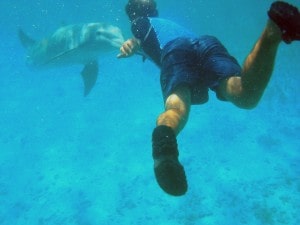Dolphin Discovery’s trainers are very used to hear “You’ve got the best job in the world!” from guests, and this week I had the pleasure of sitting down with one of our trainers to find out if indeed that is the case. Alex Mata invited me to experience life as a trainer for morning and he sat with me to tell me about himself and his life as a marine animal trainer.
Alex Mata is the Corporate Educative Trainer for Dolphin Discovery. He’s originally from Spain and began his career in Europe before coming to Dolphin Discovery in Mexico six years ago. He chose Dolphin Discovery for its outstanding corporate training department with over 100 educational courses, an ideal place to develop and grow in his career. He now works alongside expert veterinarians and biologists who push everyone to be better trainers and better people, something that sets Dolphin Discovery apart from other organizations in the world. With his expertise, knowledge and true passion for the animals and the organization, he is now in a position to train the trainers and realize his dream of devoting his life to marine animals.
We asked our fans and followers on Facebook and Twitter to post their questions for Alex, here’s what we discovered.
1. How do you become a dolphin trainer? What makes a good dolphin trainer?
First and foremost, being a dolphin trainer is not a job, it is a career and a calling. It is not necessary to have a degree, though it is beneficial to have studied marine biology, veterinary medicine or psychology. Trainers must have excellent swimming skills, a love for dolphins, the ability to speak English, a great personality for customer service and most importantly, passion. It takes about three years to obtain the title of “Trainer”, with hours spent in educational courses, 1 1/2 years as an apprentice and 1 1/2 years as an assistant. Dolphin Discovery has approximately 100 different educational courses and trainers are required to constantly be expanding their knowledge and improving their skills. Long days, hard work, sleepless nights, hot sun and pouring rain, the work isn’t always easy but for those who truly love what they do, it’s always a pleasure.
2. Do you love the dolphins? What’s the best experience you’ve had at Dolphin Discovery?
Alex smiled when I asked these questions and replied quickly to the first with an “Of course, absolutely!”. For the second question he pondered for a moment and then replied “Swimming with ten baby dolphins at the same time in Puerto Aventuras”. He described the ten babies as super playful, swimming circles around him, vocalizing loudly and teasing him into joining in their games.
3. How do you communicate with the dolphins? Can you tell if a dolphin is happy/sad/angry?
Since humans have yet to be able to translate the language of dolphins, the trainers communicate with them through body language, hand gestures and whistles. The dolphins regard the whistle as a “reward”, for them it means “Good job!” and they love to hear it. Dolphins express their emotions through their own body language and vocalizations, each in their own way. Once a trainer gets to know a particular dolphin, they can see when they are feeling excited or are getting frustrated, if they are eager to play or if they prefer to be left alone.
4. What’s the worst part of the job?
Being in Cancun during hurricane season adds extra pressure to the staff to work together, think quickly and stay calm as they move the animals to a safe environment. The dolphins come first, as a dolphin trainer at Dolphin Discovery you are commited to the animals and in an emergency they are the number one priority.
5. After feeding fish to the dolphins all day, do you still enjoy eating fish?
“Ummmm, no, I don’t eat fish anymore.”
6. What do you enjoy doing in your free time?
It seems Alex’s home life is not that much different from his work life. He lives in Cancun with his girlfriend (also an animal trainer, specializing in birds) and their 2 dogs, a chameleon, an iguana, a cockatoo, a macaw, and 3 toucans and spends his days off hanging at home with the animals.

So, is it the best job in the world? It sure seems that way! Alex spoke enthusiastically about his “family” at Dolphin Discovery, he eagerly answered even my most basic questions and he patiently walked me through the routines of the day. It was an honor for me to spend time with someone so knowledgeable and so obviously in love with dolphins (and manatees and sea lions and stingrays and sharks and animals in general!) I learned so much and am inspired by his passion, thank you so very much, Alex, can we do it again soon?




